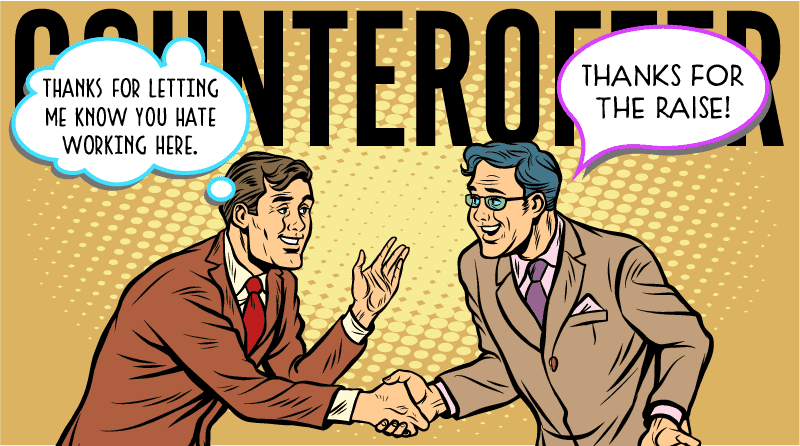Counteroffers: Why You Should Not Accept Them
In this candidate’s job market, it is not unusual for people to be juggling multiple job offers at once. It is also not unusual for candidates to be presented with counteroffers when they give notice that they are leaving their current company. While a counteroffer may be tempting at the moment, I advise my clients not to entertain them.
Employers often make counteroffers in moments of panic. “We can’t find any candidates for the requisitions we already have open! We can’t afford to lose him right now!” However, accepting a counteroffer fundamentally upends your relationship with your company and your manager. You are now the one who is known to want to leave. This can put you at a disadvantage when the time comes to make cutbacks. In addition, your company may only be making the counteroffer to buy themselves time. Time to do what? Search for your replacement. The Society of Human Resources Management (SHRM) estimates that 57% of people who accept counteroffers will leave their employer within 18 months. Many of those departures are not initiated by the employee.
Even more important is that you obviously explored opportunities outside of your current organization for a reason. It could be the work, the culture, the compensation, or the industry. The only thing that changes when you accept a counteroffer is the compensation. And that brings up an excellent, salient point: Why didn’t your employer pay you what you were worth before? You had to scare them with the thought of your departure for them to pay you the wage you want and deserve. Do you want to work for a company that only values you when you want to leave them? A counteroffer will only address compensation issues. It will not magically improve the role, culture, or team. You should be valued for the benefits you bring to any organization and be paid fairly in exchange for your services.
A counteroffer is a knee-jerk reaction to a deeper problem. Accepting a counteroffer will not solve the underlying issues you have with your current role. We know from data gathered from exit interviews across industries that people do not typically cite compensation alone as a reason for leaving a current role. Rather, it’s the manager, a culture of mistrust, a feeling that someone’s work is unappreciated, or lack of recognition for contributions made to the business that drives people out.
So don’t entertain that counteroffer! Instead, research companies from the standpoint of their culture, reputation, and find a role and team that best fits you. You are very likely to get a significant salary bump too.


